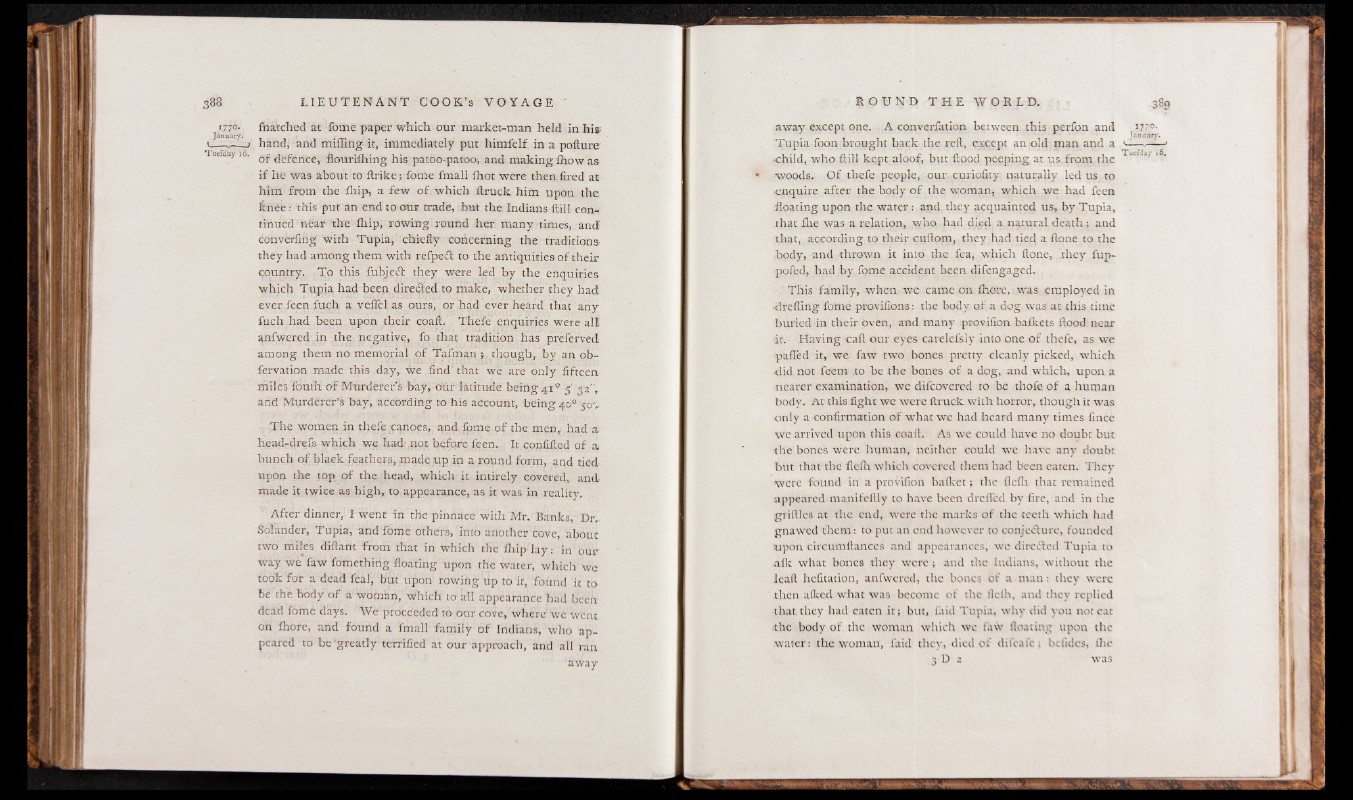
i77°- fnatched at fome paper which our market-man held in his;
January« • » < • . # (
c— x_i hand, and miffing it, immediately put himfelf in a pofture
Tuefday 16. cjcfence) flouriffiing his patoo-patoo, and making ffiow as
if he was about to ftrike; fome fmall ffiot were then fired at
him from the ffiip, a few of, which ftruck him upon the
knee: this put an end to our trade, but the Indians ftill continued
near the Ihip, rowing round her: many times, and
converting with Tupia, chiefly concerning the traditions-
they had among them with refpeCt to the antiquities of their
country. To this fubjeCt they were led by the enquiries
which Tupia, had been directed to make, whether they had
ever feen fuch a veflel as ours, or had ever heard that any
fuch had been upon their coaft. Thefe enquiries were all
anfwered in the negative, fo that tradition has preferved
among them no memorial of Tafman ■, though,, by an ob-
fervation made this day, we find" that we are only fifteen
miles fouth of Murderer’s bay, our latitude being 4.10 5' 32",
and Murderer’s bay, according to his account, being 40° cov
The women in thefe canoes, and fame of the men, had a
head-drefs which we had[rnqt before, feen. It confifted of a
bunch of black feathers, made up in a round form, and tied
upon the top of the head, which it intirely covered, and
made it twice as high, to appearance, as it was in reality.
After dinner, I went in the pinnace with Mr. Banks, Dr,
Solander, Tupia, and fome others, into another cove, about
two miles diftant from that in which the ffiip la y : in our
way we faw fomething floating upon the water, which we
took for a dead feal, but upon rowing up to it, found it to
be the body of a woman, which to ail appearance had been
dead fome days. We proceeded to our cove, where we Went
on ffiore, and found a fmall family of Indians, who appeared
to be greatly terrified at our approach, and all ran
away
S O U ND T H E WORLD. 389
away except one. A converfation between this perfon and
Tupia foon brought back the reft, except an old man and a
.child, who ftill kept aloof, but flood peeping at us from the
woods. Of thefe people, our curiolity naturally led us to
enquire after the body of the woman, which we had feen
floating upon the water: and they acquainted us, by Tupia,
that ffie was a relation, who had died a natural death; and
that, according to their cuftom, they had tied a ftone to the
body, and thrown it into the fea, which ftone, .they fup-
pofed, had by fome accident been difengaged.
1770.
January.
Tuefday 16.
This family, when we came on ffiore, was employed in
•dreffing fome provifions: the body of a dog was at this time
buried in their oven, and many provifion bafkets flood near
it. Having call our eyes carelefsly into one of thefe, as we
pafled it, we faw two bones pretty cleanly picked, which
did not feem .to be the bones of a dog, and which, upon a
nearer examination, we difeovered to be thofe of a human
body. At this fight we were ftruck with horror, though it was
■ only a confirmation of what we had heard many times lince
we arrived upon this coaft. As we could have no doubt but
the bones were human, neither could we have any doubt
but that the flefh which covered them had been eaten. They
were found in a provifion balket; the flefli that remained
appeared manifeftly to have been drolled by fire, and in the
griftles at the end, were the marks of the teeth which had
gnawed them: to put an end however to conjecture, founded
upon circumftances and appearances, we directed Tupia to
alk what bones they were ; and the Indians, without the
leaf! hefitation, anfwered, the bones of a man: they were
then afced what was become of the flclh, and they replied
that they had eaten it; but, laid Tupia, why did you not cat
the body of the woman which we law floating upon the
water: the woman, laid they, died of difeafe; betides, ffie
3 D a was